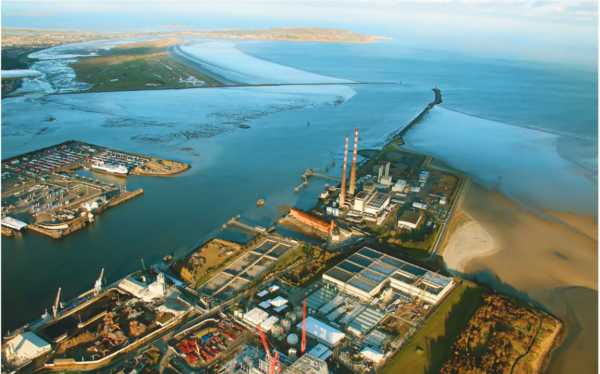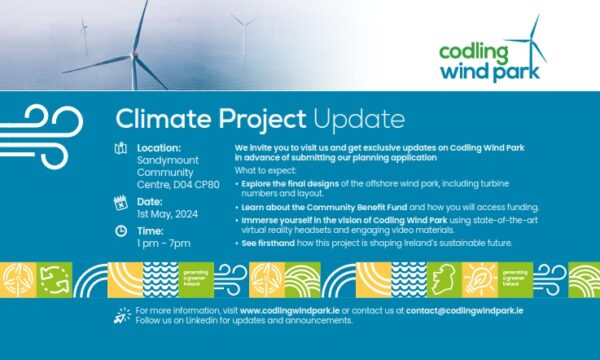
Peter McNamara
Since time immemorial, men, women and children have been plunging with delight into Neptune’s frothy domain. Sea swimming has always been popular, but in the last year with the advent of Covid, this wholesome activity has gone – if you’ll forgive the pun – mainstream. Ireland’s beaches, piers, and shores have become flooded with waves of dry-robed newcomers, much to the irritation of long-time thalassophiles – they swam in the freezing Irish seas before it was cool.
Lockdown severely limited our options for recreation, and focused many a flighty modern mind on the power and presence of the natural world. Moreover, given the good weather we enjoyed last summer, it was perhaps inevitable that more people took to this ancient recreation. And hey, it’s cheap!
But all is not rosy for the Homo-amphibian. In fact, much of the waters along Irish coasts have been found to smell quite the opposite of roses. “Bacterial loads” is the euphemism Irish Water has been using to describe the filth you might find bobbing alongside on your daily dip. Such health-threatening matter can arise in the water due to a number of factors, including “misconnections” from homes, storm water overflows, urban runoff, fouling from dogs and birds, and “human litter and waste” on beaches.
The issue is such that Irish Water has now committed to extending testing and treatment of effluent from the Ringsend sewage plant to determine if it is negatively affecting bathing-water quality in Dublin Bay.
Irish Water – Awash with Problems
Bathing water-quality is monitored during the swimming season, which runs from June to mid-September. Bathing-ban notices are regularly issued for beaches in the summer months when sewage discharges or storm water overflows result in water pollution making swimming unsafe. However, for the rest of the year swimmers are likely to be unaware if the waters are safe to enter.
Given the increased numbers engaging in year-round bathing, many swimmers have been reporting bouts of vomiting and skin infections following dips in the bay during the off-season when testing and treatment levels are reduced. Too many blameless individuals are diving head-first into what amounts to a heaving salty water closet.
The licence of the Ringsend sewage plant requires Irish Water to operate an ultraviolet (UV) light disinfection system to protect bathing waters during the summer season, but not for the other eight months of the year. UV treatment kills bacteria. It’s the same system that’s used for drinking water, so its use will help prevent people getting sick.
In a joint letter, Minister for Housing Darragh O’Brien and Minister of State for Heritage Malcolm Noonan said Irish Water is to operate the UV system past the bathing season and implement testing “across the rest of 2021.”
The letter to Green Party councillor, Donna Cooney, said “sea swimming has increased in popularity over the past year while people have been confined to their homes and we want people to be safe while enjoying their pastime.” Ms Cooney said the move was a “step in the right direction” to extending the bathing season year-round.
Irish Water confirmed it would undertake the monitoring and treatment programme. But given that “bacterial loads” are affected by several factors (runoff, misconnections, waste, etc.) they said the only designated bathing beach that might possibly be “marginally improved by turning on the Ringsend UV beyond the normal bathing season is Dollymount Strand.”
The Blue Flag System
There already is something out there that’s supposed to inform bathers about the quality of coastal waters. The Blue Flag Programme promotes sustainable development in freshwater and marine areas. It challenges local authorities and beach operators to achieve high standards in the four categories of water quality, environmental management, environmental education and safety.
Over the years, the Blue Flag has become a highly respected and recognised award working to bring together the tourism and environmental sectors at local, regional and national levels. The programme is funded in Ireland by the Department of Housing, Planning and Local Government, and is run by the international, non- governmental, non-profit organisation FEE (the Foundation for Environmental Education). The first Blue Flag was flown in France in 1985. It has been implemented in Europe since 1987 and in areas outside of Europe since 2001 when South Africa joined. It has since become a global Programme, with an ever-increasing number of countries participating.
To be granted Blue Flag status for beaches, marinas and sustainable boating tourism operators must comply with a specific set of criteria. There are requirements concerning litter disposal, toilets and other site facilities including lifeguards – in Ireland it is “imperative” that Blue Flag beaches are lifeguarded on weekends in June, daily in July and August and weekends in September unless an Irish Water Safety Risk Assessment states otherwise.
Information about bathing water quality must be also displayed, and the beach must fully comply with the water quality sampling and frequency requirements of the Blue Flag programme. To that end, no industrial, waste-water or sewage-related discharges should affect the beach area, the beach must comply with requirements for the microbiological parameters E.coli and intestinal enterococci, and with requirements for physical and chemical parameters.
In 1988, the first year sites were awarded outside of France, 19 beaches and two marinas received the Blue Flag in this country. This year, a record-breaking 93 sites were awarded, up two on last year’s total.
From Blue Flag to Poo Flag
It would seem that, given such success, Ireland must be on the right track with its water management. Unfortunately, the Environmental Protection Agency (EPA) doesn’t share this view, and have warned that the level of raw sewage that is pumped into Ireland’s waterways every day is “unacceptable.” The agency said untreated sewage from 36 towns and villages – the equivalent of 77,000 people – is released into the environment every 24 hours.
Half of the raw sewage comes from Arklow, Cobh and Kilmore Quay. It found that the wastewater treatment facilities at 21 of Ireland’s large towns and cities – including Dublin and Cork – do not meet EU standards.
Dr Tom Ryan, Director of the EPAs Office of Environmental Enforcement (OEE) said there have been some improvements in recent years. He warned however that the pace at which Irish Water is upgrading the country’s wastewater treatment infrastructure is too slow.
“Inadequately treated wastewater can pollute our environment and is a risk to people’s health,” he said. “We are seeing repeated delays in providing treatment for many areas and it is not acceptable that 13 towns and villages will still have no waste water treatment by the end of 2021… Irish Water must speed up its delivery of key infrastructure.”
Climate activist group Extinction Rebellion is raising the ‘Poo Flag’ in their #SeaChange campaign to highlight raw sewage pollution in our waters, rivers and seas. The campaign coincided with the beginning of the bathing season. In response to the pollution of the waters, the group has erected ‘Poo Flags’ in several locations where a Blue Flag status has been revoked due to the poor water quality.
According to #SeaChange spokesperson Natasha Ariff, while the practice of issuing Blue Flags for clean beaches is commendable, it is “not enough.” Swimming in waters that do not have a Blue Flag runs potential health risks, “such as gastroenteritis and diarrhoea, illnesses that are being reported by more and more people after coming in contact with the sea.”
It seems that people might need to actively avoid such flag-less places. Waters that have had Blue Flags revoked include Merrion-Sandymount Strand, Front Strand in Balbriggan, Ballyloughane, Clifden Beach and Kilmore Quay.
Irish Wildlife Trust Campaign’s Officer, Pádraic Fogarty, is fully in agreement. “For too long we have tolerated the intolerable,” he says. “In too many places we are swimming in our own filth.”
The ‘Poo Flag’ campaign comes under Extinction Rebellion’s #SeaChange movement that is urging the Government to address the urgent issue of water quality in Ireland. They are calling on the powers that be to fund wastewater treatment infrastructure, so untreated sewage is no longer routinely being discharged. In at least 33 locations around Ireland, raw sewage is being released into the sea regularly. Only half of these locations are scheduled to receive treatment in 2022 and the rest in 2023 and 2024.
Irish Sewers: Money Down the Drain?
Along with the trouble being caused to Irish coastal waters, it seems that the Irish sewerage system is causing grave damage to the environment as a whole. The issue is such that the European Court of Justice (ECJ) has found that Ireland has failed to uphold EU law in relation to almost 30 wastewater treatment schemes across the country – including the scheme at Ringsend.
The court’s 2019 ruling opens the door for Ireland to be hit with heavy fines for breaching EU rules on sewage treatment if it does not act to rectify the situation. According to the judgment, the State failed to ensure safe practices of sewage treatments in Athlone, Cork City, Enniscorthy, Fermoy, Mallow, Middleton and Roscommon Town.
Incidences of sewage spill were counted 853 times in the Cork City scheme in 2015, leading to the leakage of around six million cubic metres of untreated sewage into the environment. The ECJ also found the State guilty of failing to treat wastewater that was discharged in sensitive areas in 16 different schemes including those in Killarney, Longford, Dundalk, Navan, Nenagh, Portarlington, Roscrea and Tralee. The State also failed to provide secondary treatment facilities for 19 problematic schemes including Arklow, Cobh, Killybegs, Ringsend, Shannon and Youghal.
Beaches along Dublin bay were shut to swimmers a number of times in the last few years following wastewater overflows at the city’s treatment plant in Ringsend. The plant has been failing to cope with the amount of sewage it receives since it opened in 2003. The Bay is also a designated UNESCO biosphere reserve.
Sinn Féin councillor Chris Andrews last year made a submission to the Parliament’s Petitions Committee alleging infringement of the urban waste water treatment directive by the Government. The committee has declared the petition “admissible” and has asked the commission to begin an investigation of the issue.
The petition maintains that the poor conditions threaten water quality, biodiversity, the ecosystem and the health of more than 300,000 inhabitants. Andrews himself has said local residents and sports clubs using Dublin bay “had grown tired of the ongoing failure of the State to address the problems at the Ringsend plant.”
“There was raw sewage in Dublin Bay last summer and the local rowing clubs told me of paddling past lumps of it.”
A spokesman for the Department of Housing, Planning and Local Government which has responsibility for the matter said it had yet to be contacted by the commission, but noted the European Court of Justice had already ruled in March 2019 that Ireland was not in compliance with the waste water directive, “including in relation to Ringsend wastewater treatment plant,” he said.
It seems that in the meantime, the sea swimmers of Dublin ought to take care. That said, how many dry-robers will still be taking the plunge after the pubs re-open remains to be seen. Whomever out there intends to enjoy this ancient pleasure, it’s a classic case of look before you leap. Look for the blue flag, the poo flag – and if all else fails check for lumps!



